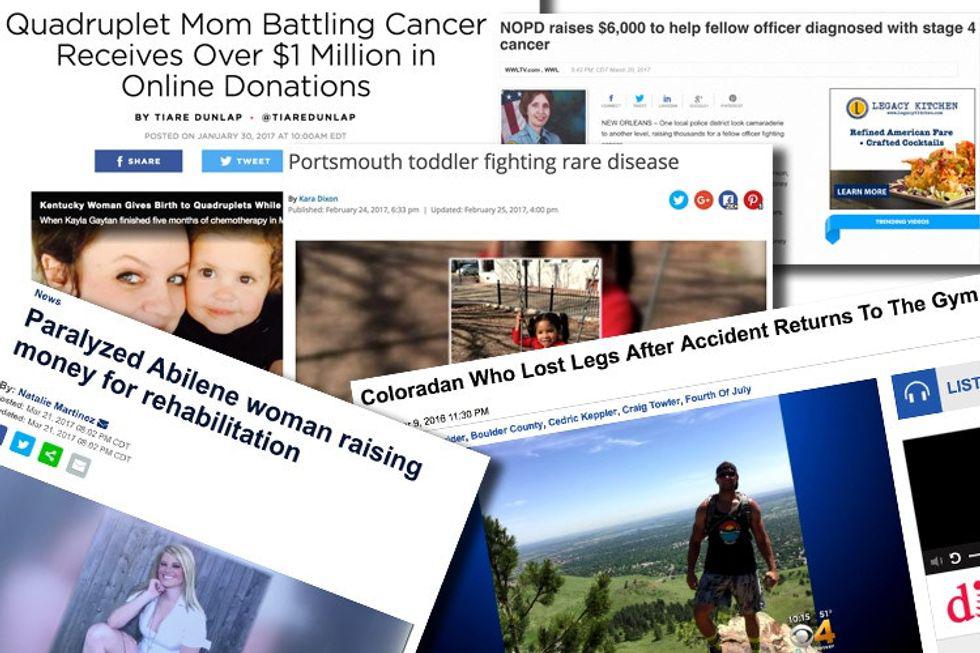Freddie Teer is a normal boy. He loves Legos, skateboarding, and horsing around with his older brother Ollie. But in March 2017, his mother faced every parent’s worst nightmare.Freddie was doing tricks down the stairs of his front porch when he fell off his bike—and his bike fell on him. “[He was] just crying, wouldn’t let us touch his leg, couldn’t put any weight on his leg. We knew,” mom Ashley says.
Ashley rushed Freddie to the emergency room, where an X-ray confirmed the bones in his left shin were broken in half. He needed to be sedated, his bones had to be set, and he was put in a cast. It was an agonizing day for the Teers. But it’s what happened next that was truly inspiring.
[rebelmouse-image 19494386 dam=”0″ original_size=”750×500″ caption=”Freddie fell of his bikeu2014and his bike fell on him.” expand=1 site_id=19596302 photo_credit=”Photo via iStock” pin_description=”” photo_credit_src=”https://www.istockphoto.com/photos/reclining-bicycle” alt=”green and yellow bike lying in grass beside red shoes”]
We’ve all seen heartwarming stories of communities coming together to raise money online to help people cover medical care costs for themselves and loved ones.
There was the Kentucky mom with stage 4 cancer whose family collected over $1 million. The New Orleans police officer whose unit banked thousands for her chemotherapy. The Colorado man who lost his legs and whose friends crowdfunded his recovery.

While Freddie’s injury required major treatment, none of Ashley’s friends raised any money for him.
No one from their town took up a collection or held a bake sale.
No GoFundMe page was started to help cover his bills.
Instead, Ashley and Freddie walked out of the hospital owing nothing. Because they live in Canada.
“You just leave,” Ashley says. “You don’t pay anything.”
Incredible.
Under Canada’s healthcare system, people like the Teers can see their doctors and go to the hospital when they’re hurt or sick, and they don’t get charged.
So heartwarming.
It almost wasn’t this way.
Ashley was born and raised in St. Louis in the U.S. where health care is expensive and complicated. In 2005, she fell in love with a Canadian man and moved with him to Abbotsford, British Columbia, where they and their five children will enjoy heavily subsidized, affordable health care coverage at a low premium for the remainder of their natural lives.
“We’re able to go when we need help and we get help,” Ashley says.
Just amazing.
As Freddie recovered, no one showed up at the Teer home with a large check or collection plate full of cash.
Instead, Ashley and her family were “supported through meals and just that kind of care”—meals they were able to enjoy without having to decide between enduring the shame of hitting up their friends for money or facing the prospect of sliding into bankruptcy.

The most uplifting part? Middle-income Canadians like the Teers pay taxes at roughly the same rates as Americans and still get their bones fixed for free at hospitals.
Not everything about Freddie’s recovery process was smooth.
The first night, Freddie tossed and turned in severe pain, unable to sleep. Ashley, however, was able to call her family doctor—who she never has to pay since he is compensated by a public system that continues to have overwhelming public support to this day (though support has dipped slightly in recent years)—to get her son a codeine prescription. Miraculous!
Canada’s public health care plan doesn’t cover drugs. But, inspiringly, because of price controls, medicine is way cheaper there.
The Teers did lean on their friends and family for help while Freddie got better.
“We were kind of just asking people to pray,” she explains—primarily to lift her son’s spirits, and not, thankfully, to ask God to provide sufficient funds to cover basic medical care that every human living in a fair and prosperous society should have access to.
Even though he wasn’t able to move around, friends and relatives eagerly invited Freddie to hang out during his recovery instead avoiding him out of guilt for not pledging enough to his GoFundMe campaign.

Just. Wow.
With support from his community, Freddie’s cast came off six weeks later, right on schedule.
Healthy once more, Freddie went right back to enjoying extreme sports like BMX biking, skateboarding, and snowboarding, and Ashley is free to let him enjoy them without worrying about one fall wiping out their entire life savings and leaving her family destitute.
“Where we live, we’re not stressful when things happen to our kids,” Ashley says. “It’s not a stressful time financially, so the whole family is not anxious.”
It’s peace of mind that she—and the residents of virtually every other rational, wealthy, industrialized country in the world—share.
“I feel safe, and I feel like my voice is heard,” she says. “I can’t imagine living in a place that I didn’t feel that way.”
This article originally appeared seven years ago.


































